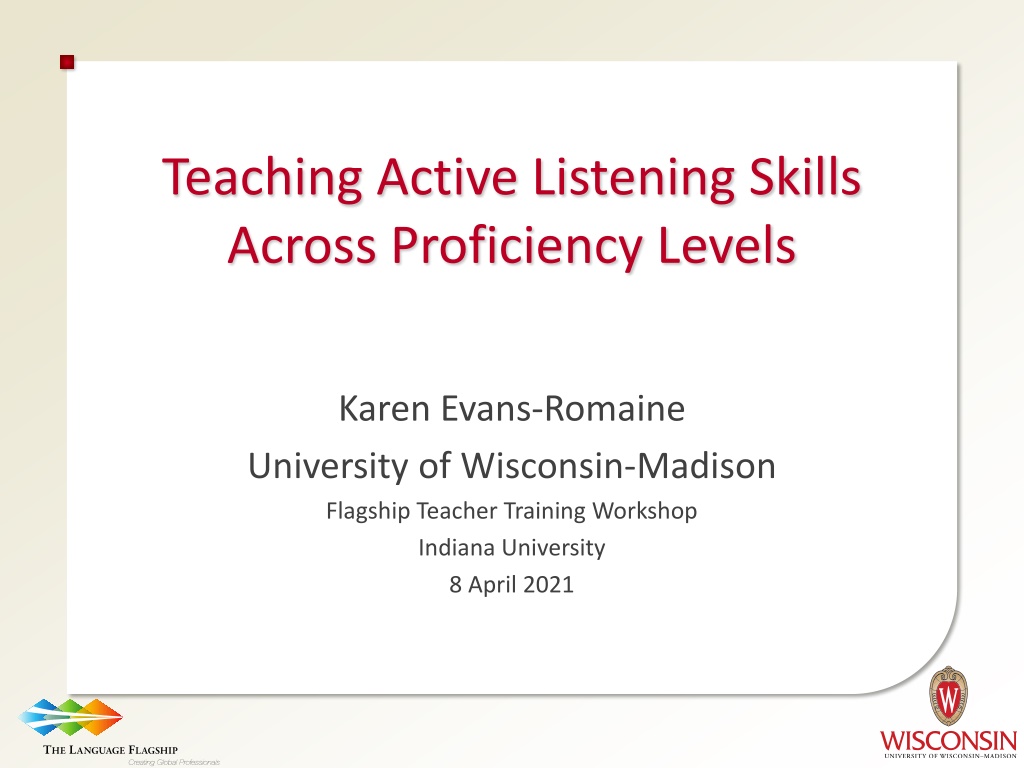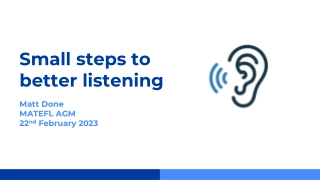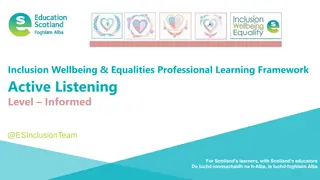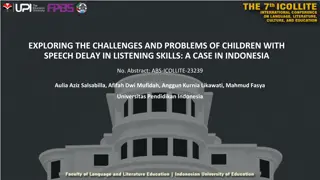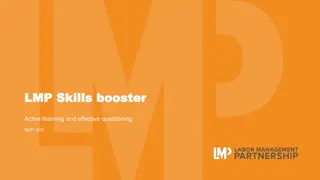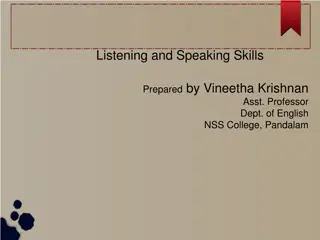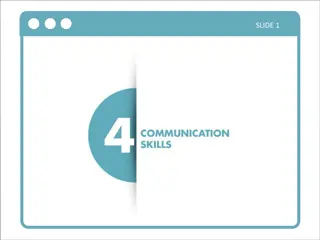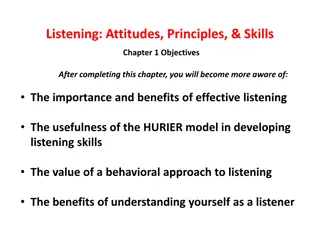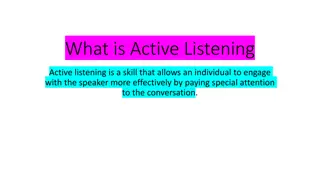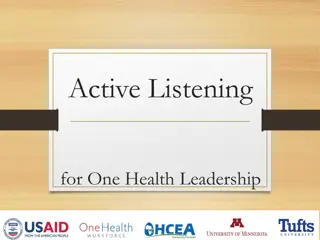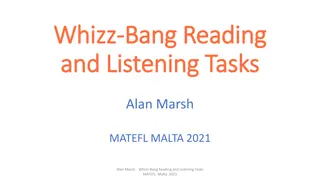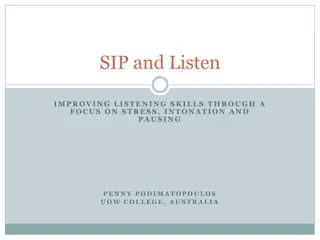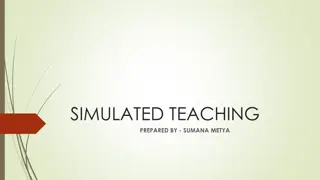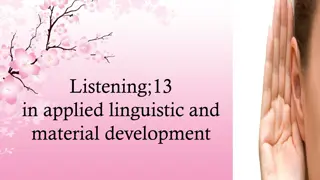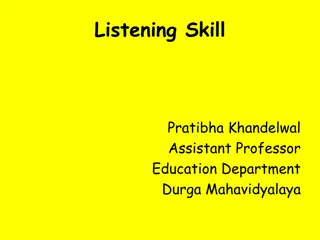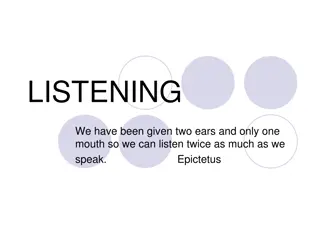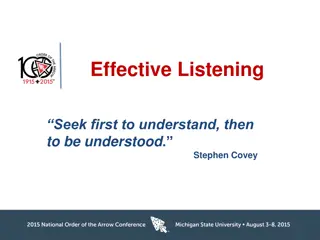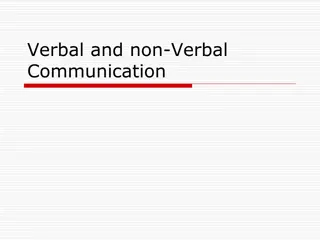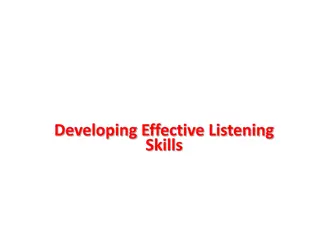Enhancing Listening Skills in Language Teaching: Strategies and Challenges
Explore the challenges and strategies for improving listening skills across proficiency levels in language teaching. From decoding word borders to applying background knowledge, discover ways to enhance listening comprehension for learners. Gain insights into micro and macro skills that contribute to effective listening practices in educational settings.
Download Presentation

Please find below an Image/Link to download the presentation.
The content on the website is provided AS IS for your information and personal use only. It may not be sold, licensed, or shared on other websites without obtaining consent from the author. Download presentation by click this link. If you encounter any issues during the download, it is possible that the publisher has removed the file from their server.
E N D
Presentation Transcript
Teaching Active Listening Skills Across Proficiency Levels Karen Evans-Romaine University of Wisconsin-Madison Flagship Teacher Training Workshop Indiana University 8 April 2021
What makes listening challenging? Your thoughts? Write them in the chat!
What makes listening challenging? Brown & Lee, Teaching by Principles (2015) Decoding word and phrase borders ( clustering ) Features characteristic of spontaneous speech: Redundancy Errors and error self-correction Contractions ( , ) and reduced forms ([ ] [ ]?) Hesitations, conversational additions ( you know, like ) Speech rate Acoustic interference Memory: in real life we often can t go back to what we heard
What factors aid listening comprehension? Real-world knowledge of subject, genre ( top-down processing) Redundancy in speech Interpersonal mode: possibility to request repetition or slower tempo Recording: possibility of replay at micro level Video: visual cues All of these can be controlled in listening activities
Brown & Lee: Micro-skills Learning to recognize word and phrase borders Learning to recognize grammatical forms (from case endings to syntactic cohesive devices) and use them to aid comprehension Learning to identify contractions ( , , reduction in various forms) Learning to listen for specific meaning (word, phrase, number, fact, etc.)
Brown & Lee: Macro-skills Applying background knowledge to the subject Using visual cues to aid in comprehension Outlining a narrative of events: one way to test this is to have learners reorder items provided in jumbled order: to reconstruct a narrative from parts, or to describe a place from bits of information provided about it Outlining: distinguishing major points (the main idea) from supporting points
Review of Listening Skills by ACTFL Level Novice: words and phrases, lists Intermediate: sentences, questions and answers, brief factual information from everyday life Advanced: paragraphs, narratives, descriptions in all three time frames; includes short news reports, feature items on the news Superior: extended discourse, outlining (main idea vs. supporting ideas), interpreting rhetorical stance or implied meanings
Culture through Listening What do you see on the video that surprises you? What aspects of culture are evident in the video? (Silent watching can be helpful here too.) What aspects of culture are reflected in speech? What cultural insights come from this video?
Example 1. Golosa 1, Unit 6: Apartment Pre-listening activities, schemata activation: What do you expect to hear when someone gives you a tour of their home? What do you expect to find in an apartment? What is a dacha? Vocabulary review: rooms, furniture, parts of building (floor, corridor, entrance, etc.) Cognates learners might expect to hear: corridor, divan, electronics (television, computer, etc.)
Example 1. Golosa 1, Unit 6: Apartment Golosa, Unit 6: https://www.youtube.com/watch?v=AUma3zBo-hk Minute 2 3.40: apartment in Arkhangelsk Minute 3:40 4:30: apartment in Petersburg Minute 4:30 7:56: dacha Activities during listening (Brandl has an extensive list): o List rooms; furniture o Matching (Who is doing what with their housing? Who lives where? What does this word mean?) o Check off from a list what words are said (furniture, rooms, etc.) o True/false, multiple-choice o Fill-ins; short-answer responses
Example 1. Golosa 1, Unit 6: Apartment Post-listening extension activities: Tell your partner about the apartments and dacha on the video. Make a drawing/scheme of one or more of these living places with your partner. One retells, the other makes a drawing/scheme. Tell your partner about your house/apartment. Write a composition about MM s dacha, about the apartment in Arkhangelsk, or about your house/apartment Conduct a video tour of your apartment/house/neighborhood. Read some apartment ads; write an ad for one of the apartments or the dacha in the video.
Example 2. . . 2010 ( !) Intermediate-level activity https://www.youtube.com/watch?v=D6sWt-xWZ6Y More complicated vocabulary, including ski words and slang Faster speech rate Acoustic interference: background music and sounds Video sped up, blurred, scrambled
Example 2. . Pre-listening activities, schemata activation: What might you expect to hear when someone gives you celebrity a tour of a ski lodge in the Alps? Vocabulary review: rooms, furniture, parts of building (floor: corridor, entrance, etc.); cleaning and housekeeping ( , , / , / ) New vocabulary: House words: , Ski words, equipment; slang they ll hear ( , , ); / ( )
Example 2. . Activities during listening: o Novice to Intermediate comprehension guide: o Check off from a list what words are said (furniture, rooms, etc.) o Global listening: What did you catch? Talk with a partner. o What rooms did he mention? o How many floors? o What does he like to do in the house? o What do you want to learn more about?
Example 2. . Activities during listening: o True/false, multiple-choice o Fill-ins ( ...; short-answer responses ( ? ?); - Life is good! ? (3 ); ? o Micro-activities on vocabulary building: - (pearl, snowboard; : inside/outside, up/down; plasma screen; protective glass); - ( , / , ); ( . . . .?); o Micro-activities on motion and placement/positioning verbs: check off verbs from list ( / , / , [ ], / , , / )
Example 2. . Activities during listening breakdown by room: o ? o ? o ? (either check off a list or open-ended) o ? ? o protection, ? o ? o o o o ? o ? ? o (skip 5.30 5.45) o ? ? (skip 6.06 7.16)
Example 2. . Discussion post-listening: ? ? ? ? ? : ? ? ? ? ? ? ?
Example 2. . Micro-skills post-listening activities: Exercises with motion verbs used in the clip Mini-descriptions of rooms Descriptions of still shots in pairs Focus on language for speaking: . . . . ( .) , , . . . , .
Example 2. . Post-listening extension activities: Tell your partner about the house. Reconstruct the house tour: make a map. Write an alternate narration for the video. Timati wants to rent out his house off-season. Create a tourist brochure. Conduct a video tour of your celebrity home / dream home.
Advanced-level listening course on media Instructional Methods Vocabulary preparation (for example, from Larisa Moskvitina, In the World of News [ ]) Movement back and forth from content, to micro-level focus on language and content, to open discussion of content (from top-down to bottom-up strategy instruction and back again) Exercises geared toward noticing and learning new expressions in carefully guided contexts, use of islands (Shekhtman)
Sample Class: Documentary Film or Interview Film assigned for homework with series of content questions In class review of film and discussion of content questions: Macro: play one scene or segment in full (examples from Gorbachev film: opening on perestroika; introduction to Brezhnev), have students discuss relevant content questions in small groups Micro: play scene/segment again, pausing to focus on both responses to questions and on specific phrases Macro: play entire scene/segment again, have students discuss answers to questions in small groups; go over responses together as a class Micro: focus again on responses and to review specific linguistic features, synonyms, reconstruct phrases for acquisition and adaptation Macro: global discussion of scene/segment, storyline, featured figures, historical context
Example 3. ( , 2011) https://www.youtube.com/watch?v=TF_ignSFcd4&t=177s Pre-listening activities, schemata activation: Students will have read a brief online biography of Gorbachev. Class discussion in small groups, then together: ? , ?
Example 3. ( , 2011) Activities during listening: First playing of opening clip, 1.5 minutes (1.30). Questions to take notes on and discuss in pairs (global comprehension): ? ( ?) ? ? Fill-ins/short answers: : ____________________________________ ? ? ? _________________, _____________________. __________________________________. _________________________.
Example 3. ( , 2011) Micro-activities during listening: Fill-ins/short answers, cont.: - _____________________. - __________________________________. : ___________________ __________________________ . _____________________________. : __________________________________? . . ______________________________. ___________________________ _______________________________ . ________________________ ____________________________________.
Example 3. ( , 2011) Micro-activities after listening. - : This happened for the first time. They built a monument for the 40thanniversary of victory. Be closer to us! We won t let you down! General Secretary of the Communist Party Ruler; all-powerful (omnipotent) ruler He isn t getting into the limousine! He is going to speak to the people. Someone is carrying a crying child. They are showing this on television. On the corner of is where perestroika began.
Example 3. ( , 2011) Macro-activities after listening Review answers to initial questions in small groups In small groups: retell the story: ? ? ? ? ? Extension activities Write a summary of the opening scene. Provide your own narration of this scene. Write a mini-presentation about this scene and its importance.
Your turn! Choose a clip: Novice: Golosa, Book 1, Unit 3: https://www.youtube.com/watch?v=vNovSnDi0HA Intermediate: Kirill Serebrennikov, : https://www.youtube.com/watch?v=Bc4VwGeE4AM Advanced Low: Vladimir Pozner on COVID-19 (to 10.52): https://www.youtube.com/watch?v=7wXuGhkJSKs&t=30 6s Draft pre-listening, listening, and post-listening discussion and extension activities.
One example of an advanced-level course: Slavic 555: Advanced Russian Listening & Speaking: Course Structure
Slavic 555: Advanced Russian Listening & Speaking Course Topics Lessons from Russian History (primarily Advanced) Introduction to Russian-language Press (upper Intermediate/Advanced) Press and Politics (primarily Advanced) Russian Economic and Foreign Policy (Advanced/Superior) Healthcare: Covid-19 (2020); American Healthcare and the American Dream (Advanced/Superior) Culture and National Identity (Advanced/Superior)
Slavic 555: Course Featured Figures in 2020 ( ) Soviet and Post-Soviet History Svetlana Alexievich (Nobel Prize speech) Mikhail Gorbachev (documentary film with interviews) Politics and Foreign Affairs Vladimir Putin (speeches, press conferences) Minister of Foreign Affairs Sergei Lavrov (speech, talk show appearance) Opposition Figures Boris Nemtsov (documentary films, monologue) Mikhail Khodorkovsky (interviews) Alexei Navalny (interviews, documentary film appearance) Pussy Riot (news segments, interviews)
Slavic 555: Journalists and Documentary Filmmakers featured in 2020 Marina Goldovskaya (RAILS* interviews on making documentary films) Leonid Parfyonov (documentary film, interviews as both interviewer and interviewee) Vladimir Pozner (mini-series , interviews as both interviewer and interviewee) Iurii Dud (interviewer: Pozner, Khodorkovsky, Navalny) Vladimir Kara-Murza (documentary film) * Russian Advanced Interactive Listening System, UW- Madison (currently being updated)
Slavic 555 Genres, 2020: Speeches and Related Domestic policy Putin press conference (Dec. 2019) Putin address to Federal Assembly (Jan. 2020) Covid-19: Putin address to Russian citizens on Covid-19 (April 2020) RBK news segment on Covid-19 in Europe (April 2019) Foreign policy: Sergei Lavrov UN speech (Sept. 2019) Lavrov appearance on (Sept. 2018, March 2021)
Slavic 555 Genres, 2020: Interviews and Related Nemtsov monologue about Putin (following documentary films about Nemtsov) Parfenov and Pozner interview with Alexei Navalnyi Al bats interview with Mikhail Khodorkovsky Dud interviews Pozner, Khodorkovsky, Navalny Sindeeva (Dozhd ) interview with Parfyonov on life during Covid-19
Slavic 555 Documentary Film Assignments, 2020 Parfyonov, (on Gorbachev, 2011) Kara-Murza, (2016) Fishman and Krichevskaya, (on Nemtsov, 2017) Homework: website(s) for background, short- answer content questions in Russian to be discussed in class and submitted in writing
Slavic 555 Spiraling Principle Parfyonov (documentary film, 2011) Footage of Moscow demonstrations, 2011-12 Interview with Pozner of Navalny (2012) Interview with Parfyonov on life during Covid-19 (2020) Pozner: Article published in Moskvitina, (2002) Interview with Parfyonov of Navalny (2012) Interview of him by Dud (2017) (2008)
Slavic 555 Spiraling Principle Nemtsov: Footage of Moscow demonstrations, 2011-12 Kara-Murza, (2016) Fishman and Krichevskaya, (on Nemtsov, 2017), including Navalny Monologue, (2017) Navalny: Interview with Pozner and Parfyonov (2012) Appearance in documentary film on Nemtsov (2017) Dud interview (2017) Video on constitutional referendum (2020)
Slavic 555 Spiraling Principle Covid-19 Kirill Serebryannikov on surviving isolation at home (with thanks to Shannon Spasova, Michigan State University, and the University of Arizona CERCLL) RBK news segment on Covid-19 in Europe Putin address Parfyonov interview on Pozner interview on
Assessment: Oral Exams Questions, distributed in advance and chosen by lottery at the exam, focus on Advanced-level functions: narration and description in past, present, future; paragraph-length discourse. For example: 1. . 2. , , . ? , ? , ? 3. . 4. , : , ? : , ? , ?
Thank you for your attention! Questions?
Selected Bibliography ACTFL World-Readiness Standards for Learning Languages (https://www.actfl.org/publications/all/world- readiness-standards-learning-languages) Mahmoud Al-Batal, University of Texas at Austin. Listening. Foreign Language Teaching Methods. COERLL.utexas.edu/methods/modules/listening Klaus Brandl, Communicative Language Teaching in Action (Pearson, 2008) H. Douglas Brown and Heekyeong Lee, Teaching by Principles: An Interactive Approach to Language Teaching (Pearson, 2015)
Selected Bibliography, cont. Betty Lou Leaver & Boris Shekhtman, eds., Developing Professional-Level Language Proficiency (Cambridge UP, 2002) Cynthia Martin, Moving from Intermediate to Advanced in Russian, ACTR webinar, 1 December 2016 Martin, Strategies and Anti-Strategies for Reading ILR 2 / Advanced Proficiency, UCLA, 2 August 2017 Larisa Moskvitina, V mire novostei, 3 vols. (St. Petersburg: Zlatoust, 2005-2013) Boris Shekhtman, Working with Advanced Foreign Language Students (Salinas, CA: MSI Press, 2003)
